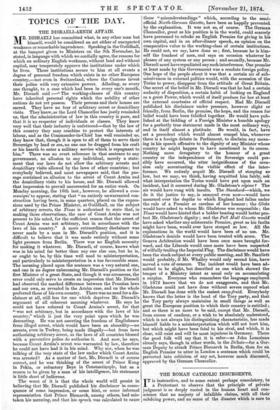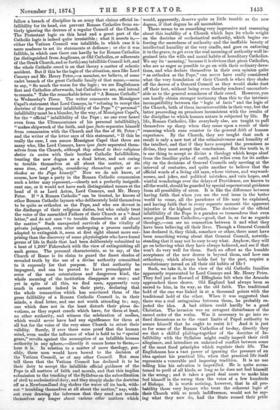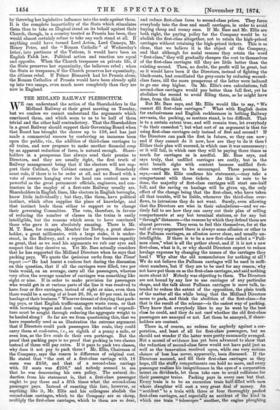'nib ROMAN CATHOLIC INSURGENTS.
IT is instructive, and to some extent perhaps consolatory, to a Protestant to observe that the principle of private judgment is so deeply rooted in the human heart and con- science that no majesty of infallible claims, with all their subduing power, and no sense of the disaster which is sure to
impugned, and can be proved to have promulgated an Such, we take it, is the view of the old Catholic families error of the most ostentatious and dangerous kind, the apparently represented by Lord Camoys and Mr. Henry Petre. whole meaning of the institution disappears at once ; and They feel just as Howard of Effingham felt when the Armada yet in spite of all this, we find men, apparently very approached these shores. Old England had always been as much in earnest indeed in their piety, declaring that sacred to him, in its way, as the old faith. The traditional the whole transaction which has convinced them of the hold of the one was linked in at a thousand points with the gross fallibility of a Roman Catholic Council is, in their traditional hold of the other. When it was suggested that minds, a dead letter, and one not worth attending to;. nay, there was a real antagonism between them, he probably re- one which does not in the least disturb their pious de- jected the idea. A bad citizen could hardly be a good votions, as they repeat creeds which have, for them at least, Christian. The invasion was an arrogant disturbance of the no other authority, and witness the celebration of maws, sacred order of the realm. Was it necessary to go into re- which would never have had any significance for them at fined discussions as to the exact limits of Papal authority to all but for the voice of the very same Church to attest their assure himself that he ought to resist it? And it is just validity. Surely, if ever there were proof that the human so for some of the Roman Catholics of to-day, directly they mind, even under the influence of what is held to be "special see that a skilful plaiting-together of the doctrine of In- grace," revolts against the assumption of an infallible human fallibility with the Syllabus might really imperil their civil authority in any sphere,—directly it comes home to them,— allegiance, and introduce an unheard-of conflict between some here it is. In relation to a matter of mere theology, pos- of the most fixed principles which regulate their life. The sibly, these men would have bowed to the decision of Englishman has a vast power of ignoring the pressure of an the Vatican Council, as of any other Council. But once idea against his practical life, when that practical life itself tell them that the Vatican Council has declared it to be represents a venerable and imposing tradition. It is no use their duty to accept the infallible official guidance of the telling him his salvation is imperilled. He is quite awns- Pope in all matters of faith and morals, and that this implies tamed to peril of all kinds, so long as he does not feel himself submission to the teaching of the Syllabus on the subordination in the wrong ; and it takes a good deal more to make him of civil to ecclesiastical duty, and they simply shake the doctrine feel himself in the wrong than the votes of a few hundreds off as a Newfoundland dog shakes the water off its back, with- of Bishops. It is worth noticing, however, that in all pro- out "troubling themselves at all about the matter," nay, with- bability those very laymen who treat the coherent logic of out even drawing the inference that they need not trouble their Church with so much indifference, would not be say- themselves any longer about various other matters which lag what they now do, had the State roused their pride follow a breach of discipline in an army that claims official in- would, apparently, deserve quite as little trouble as the new fallibility for its head, can prevent Roman Catholics from en- dogma, if that dogma be all moonshine. tirely ignoring the decrees of a regular Council of the Church. There seems to us something very impressive and reassuring The Protestant logic on this head and a great part of the about this inability of a Church which lays its whole weight
Catholic logic is indeed quite irresistible ; what it asserts is,— on the doctrine of ecclesiastical authority, which begins en- either the Vatican Council was infallible, in which case it is forcing the sacredness of authority and the ineffable beauty of mere madness to set its statements at defiance ; or else it was intellectual humility at the very cradle, and goes on enforcing fallible, in which case there can hardly be for Roman Catholics it to the grave, to get even the real meaning of authority well in- (as distinguished from Anglicans, or Old Catholics, or adherents grained into the wills and moral habits of hereditary Catholics. of the Greek Church,and so forth) any infallible Council left, and We say its ' meaning,' because it is obvious that pious Catholics, the whole Catholic creed is on that theory a matter of eclectic who are as eager as possible to go on with their ordinary devo- accident. But if this be the logic of the situation, men like Lord tions, and who declare themselves in their own opinion quite Camoys and Mr. Henry Petre,—a member, we believe, of some " as orthodox as the Pope," can never have really considered cadet branch of the great Catholic family of that name,—seem what the very foundation of their Church is when they shake to say, " So much the worse for the logic ; we are Englishmen off the decree of a General Council as they would shake dust first and Catholics afterwards, but Catholics we are, and intend off their feet, without being even thereby rendered unoomfort- to remain." Take the remarkable letter of "A Roman Catholic" able as to the general soundness of their creed. However, you to Wednesday's Times. The writer comments on Monsignor can hardly obtain stronger testimony than this to the intrinsic Capers statement that Lord Camoys, in " refusing to accept the incompatibility between the logic of facts " and the logic of doctrine of the personal infallibility of the Pope " (" personal" the Church, both of them incontrovertible in-their way, but the infallibility must be a blunder, by the way, of Monsignor Capers, latter proceeding on premisses inconsistent with the results of for the " official " infallibility of the Pope ; no one ever heard the discipline to which human nature is subjected by life. By even from the Ultramontanes of his personal infallibility), life, Roman Catholics, like everybody else, are taught to pull "makes shipwreck of the faith, and ipso facto separates himself themselves up sharp when they come upon a result of their from communion with the Church and the See of St. Peter ;" reasoning which runs counter to the general drift of human and the writer of the letter says of this statement, "If this be experience. By the Church, they are taught that such a really the case, I can assure Monsignor Capel that there are result is only a new test of the submissiveness and humility of many who, like Lord Camoys, have ipso facto separated them- the intellect, and that if they have accepted the premisses as selves from the Church, although they attend to their religious divine, they must accept the conclusions. But the truth is, it duties in union with their brother Catholic Infallibilists, is one thing to accept as divine a theology which keeps aloof treating the new dogma as a dead letter, and not caring from the familiar paths of earth, and relies even for its autho- to trouble themselves at all about the matter, at the rity on the decisions of General Councils only meeting at the same time, and justly, considering themselves quite as or- interval of centuries, and quite another to believe that the thoclox as the Pope himself" Now we do not know, of aficial words of a living old man, whose virtues, and wayward.. course, how large a party in the Roman Catholic communion nesses, and jokes, and political mistakes, and vain hopes, and such a letter may represent,—clearly not a perfectly insignifi- wistful wonderings over the delays of Providence, are known to cant one, or it would not have such distinguished names at the all the world, should be guarded by special supernatural guidance head of it as Lord Acton, Lord Camoys, and Mr. Henry from all possibility of error. It is like the difference between Petre. If "A Roman Catholic" can be trusted, he knows of having faith that when you see the real issue in the better other Roman Catholic laymen who deliberately hold themselves world to come, all the paradoxes of life may be explained, to be quite as orthodox as the Pope, and who are devout in and having faith that in every separate moment the apparent the discharge of their religious duties, but who ealraly treat injustice is the highest justice. The doctrine of the official the voice of the assembled Fathers of their Church as a "dead infallibility of the Pope is a paradox so tremendous that even letter," and do not care "to trouble themselves at all about some good Roman Catholics,—good, that is, as far as regards the matter." Such unexpected survivals of the vitality of theology,—can see no connection between it and what they private judgment, even after undergoing a process carefully have been believing all their lives. Though a General Council adapted to extinguish it, seem at first sight almost more sur- has declared it, they think, somehow or other, there must have prising than the discovery of some physiologists who have found been something wrong about that General Council, notwith- germs of life in fluids that had been deliberately submitted to standing that it may not be easy to say what. Anyhow, they will a hest of 1,200° Fahrenheit with the view of extinguishing all go on believing what they have always believed, and see if that such germs. The personal characteristic, so to say, of the won't do very well for them. Such an effort as the humble Church of Rome is its claim to guard the finest shades of acceptance of the new decree is beyond them, and how can revealed truth by the use of a divine authority committed orthodoxy, which always holds fast by the past, require a to it expressly for that purpose. If that authority be revolutionary inroad on all their old habits of life?
by throwing her legislative influence into the scale against them. It is the complete impartiality of the State which stimulates them thus to take an illogical stand on its behalf against their Church, though, in a country treated as Prussia has been, they would almost certainly refuse to take any such stand at all. If anything could have turned Lord Acton, Lord Camoys, Mr. Henry Petre and the "Roman Catholic" of Wednesday's letter, into ;artisans of the Vatican, it would have been an English Falck law. Political action and reaction are equal and opposite. When the Church trespasses on private life, if the State preserves her equanimity, the believers rebel ; when the State so trespasses, if the Church preserves her equanimity, the citizens rebel. If Prince Bismarck had let Prussia alone, Are Roman Catholics of Prussia would have been already split up into two camps, even much more completely than they are now in England.




































 Previous page
Previous page